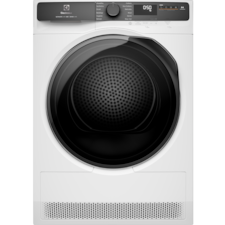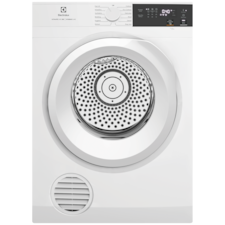In tropical climate, drying clothes quickly and efficiently can be challenging, especially during the rainy season. A clothes dryer is an invaluable addition to your household, offering convenience and ensuring your laundry stays fresh and clean, no matter the weather.
If you think that it might be time for you to get one, here are some tips to keep in mind when choosing a dryer that will work best for you and your lifestyle.
1. What is a clothes dryer?
A clothes dryer is an essential home appliance that uses heat and airflow to dry wet laundry. Unlike traditional sun drying, it ensures consistent results without relying on outdoor conditions.
A dryer provides convenience, eliminating worries about unexpected rain or high humidity. It also promotes hygiene by reducing exposure to airborne pollutants and odors, while protecting fabrics from fading caused by sun exposure.
2. Types of dryers
Choosing the right dryer type is crucial to meet your household’s needs. Below is an overview of the three main types:
Heat pump dryer
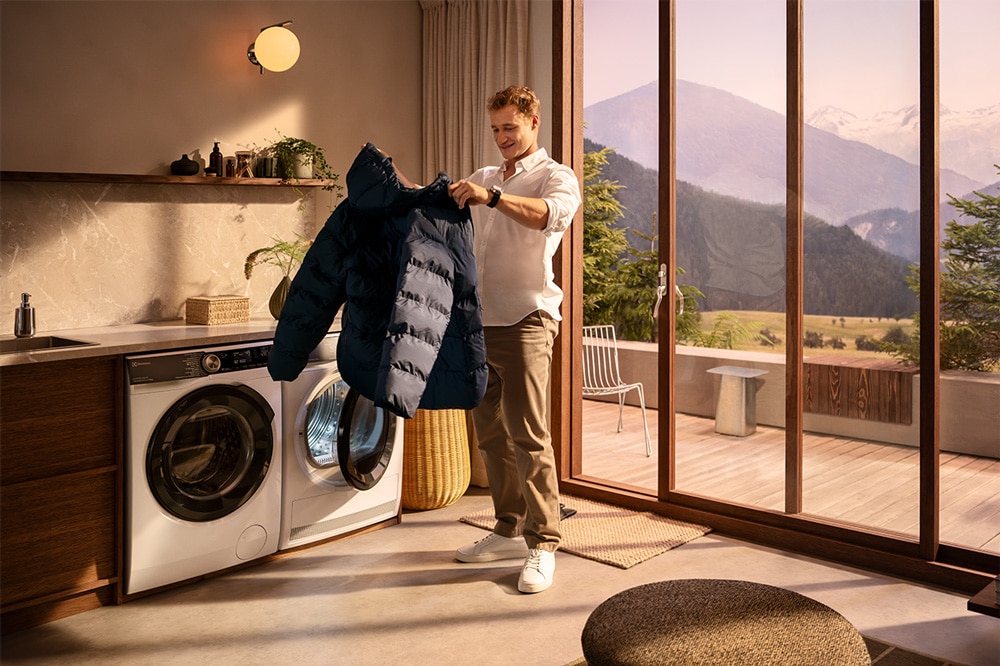
The type of dryer machine uses a vapor compression system to dry clothes. The condenser heats air, which passes through the drum to evaporate moisture out of the clothes, and the evaporator condenses water out of the air stream. Since a heat pump dryer uses a lower temperature to dry clothes, it offers better drying efficiency and fabric protection, as well as less energy consumption.
Check out some Electrolux heat pump dryers:
-
- Smart sensors protect clothes from overdrying.
- Dries effectively using 60% less energy.
- Removes 99.9% of common certain bacteria and viruses.
-
- Reduce wrinkles and refresh clothes with steam.
- Perfectly dries down jackets and duvets.
- Gently dry even the most delicate items.
-
- Perfectly dries down jackets and duvets.
- Gently dry even the most delicate items.
- Dries effectively using 60% less energy.
Condenser dryer
A condenser dryer uses a heating element to warm the drum and dry the clothing. Unlike heat pump dryers and venting dryers, condenser dryers work by condensing the moisture from your laundry into water, which is then collected into a container, and you have to empty the water yourself.
The benefit of a condenser dryer is that it can be installed anywhere — may it be the laundry room, the kitchen, or even below the cabinets — without having to install a vent to pump the water outside your house.
Venting dryer
The main difference between a condenser and vented dryer is the way they remove water. In a vented dryer, water and hot air are vented outside of the house through a hose. However, if you don't want to connect your venting dryer with the drainpipe, you will have to place the machine in an open area. For this reason, there is an added level of complexity in the installation of venting dryers.
However, vented dryers are usually cheaper than condenser dryers. Plus, you don’t have to worry about emptying any water from the machine, as it does it all for you.
Find out our range of venting dryers here:
-
- ReverseTumbling reduces wrinkles for easy ironing.
- Remove common bacteria and viruses when drying.*
- Sensors adjust cycle time to care for clothes.
-
- ReverseTumbling reduces wrinkles for easy ironing.
- Remove common bacteria and viruses when drying.*
- Sensors adjust cycle time to care for clothes.
Dryer comparison: Vented dryer vs heat pump dryer vs condenser dryer
For larger homes with ventilation access, vented dryers are ideal. Condenser dryers are well-suited for urban living, while heat pump dryers are perfect for energy-conscious households. Refer to the table below for the pros and cons of each type to see which one suits your preferences.
|
Types of dryer |
Pros |
Cons |
|
Heat pump dryers |
Energy-efficient and gentle on clothes. |
Higher upfront cost and slightly longer drying times. |
|
Vented dryers |
Affordable and efficient at drying clothes. |
Require proper ventilation and are not ideal for small spaces. |
|
Condenser dryers |
No need for external ventilation and easy to install. |
Consume more energy and require regular maintenance of the water tank. |
Related reading:
3. Dryer size guide
Choosing the right dryer capacity ensures efficiency and convenience. Use the table below to determine the best fit for your household's needs:
|
Capacity |
Recommended for |
Example uses |
|
6-7 kg |
Singles or couples with minimal laundry needs |
Small loads, delicates |
|
7-10 kg |
Medium-sized families |
Mixed fabrics, bedsheets |
|
10+ kg |
Large households or heavy-duty use |
Comforters, towels, bulky items |
Besides dryer capacity, you must also consider the dimensions of dryer. The dryer you choose must accurately fit within the allocated space.
|
Types |
Dimensions |
Ideal for |
|
Compact models |
Around 45-60 cm wide, 60-70 cm high |
Singles, couples or homes with limited space |
|
Standard-sized dryers |
Usually 60 cm wide and 85 cm high |
Small to medium-sized families |
|
Large models |
Over 70 cm wide and taller than standard models, offering maximum capacity |
Large households or heavy-duty laundry needs |
Important notes when installing a dryer:
- Measure your installation area carefully, including door clearance.
- Leave a gap of 5-10 cm for ventilation and airflow.
- Consider stackable models for limited space
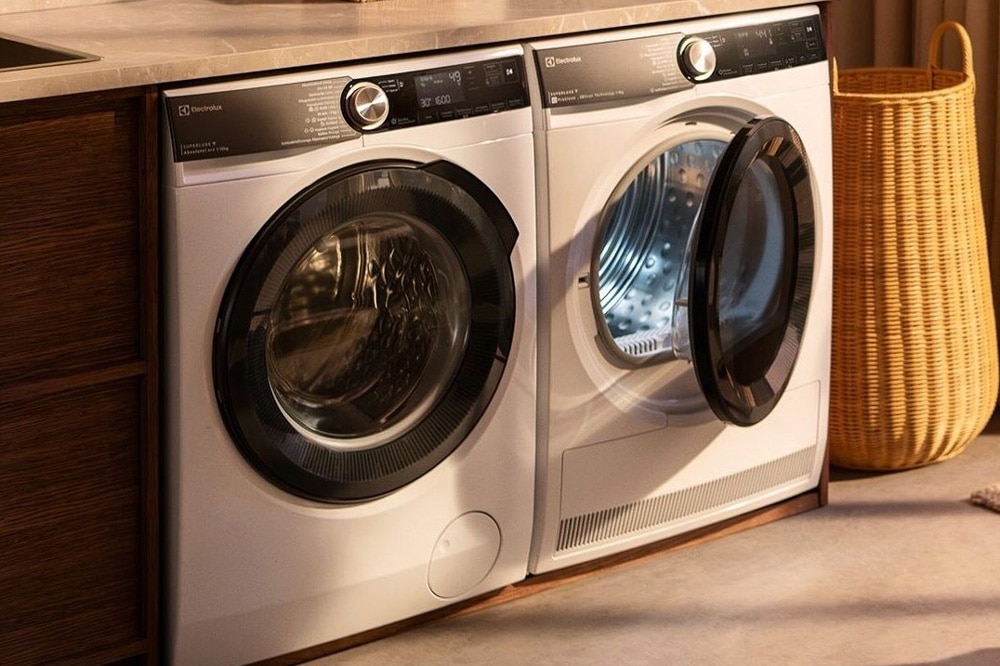
4. Key features to consider
When choosing a dryer, several key features should be evaluated to ensure it meets your household needs:
Drying systems and programs
Modern dryers come equipped with various drying programs, catering to different fabrics and needs. Whether it’s a quick-dry option for busy days, a gentle cycle for delicate, or an anti-wrinkle setting, these programs add versatility and ensure optimal care for your clothes.
Energy efficiency
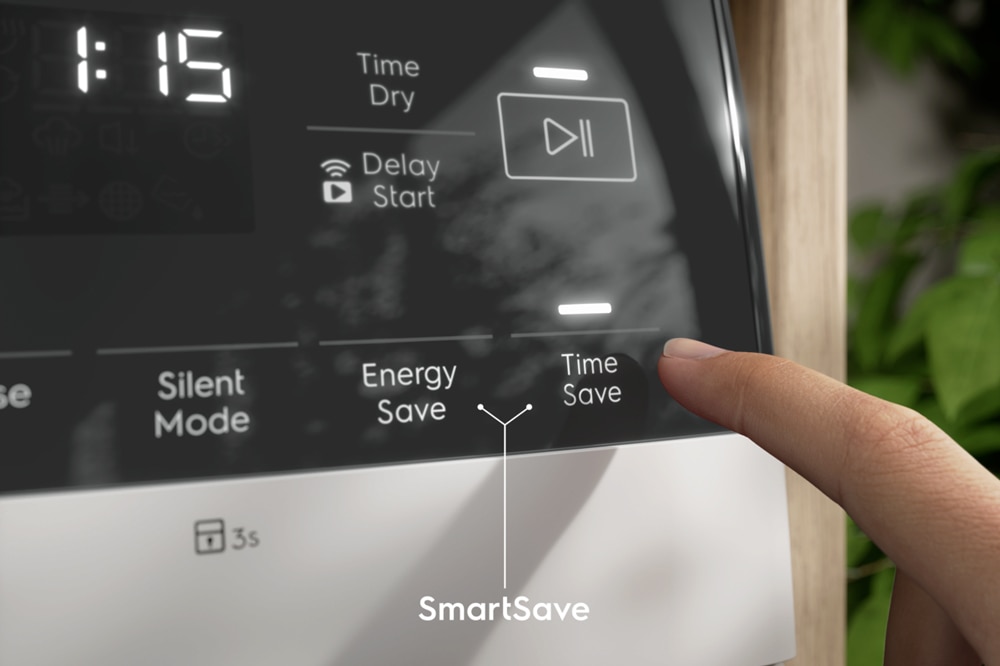
Look for models with high energy ratings to save on electricity bills. Heat pump dryers, which recycle heat during the drying process, are especially energy-efficient and environmentally friendly.
Noise levels
For households where the dryer will be placed near living spaces or bedrooms, noise levels can be a significant consideration. Choosing a model with quieter operation ensures minimal disruption.
Technology and innovations
Advanced features such as moisture sensors and steam cycles can enhance drying precision and efficiency. Moisture sensors prevent over-drying, preserving the quality of your clothes, while steam cycles refresh garments and reduce wrinkles.
Smart features
Wi-Fi-enabled dryers allow you to control and monitor drying cycles remotely, adding convenience for tech-savvy users. These features also integrate seamlessly with smart home systems for enhanced functionality.
Evaluating these features helps you select a dryer that blends advanced technology, energy savings, and tailored performance.
5. Additional considerations
When purchasing a dryer, it’s important to consider various factors to ensure you select a model that fits your household needs and provides long-term value. From installation requirements to brand reputation, each aspect plays a vital role in your overall satisfaction. Below are some key points to keep in mind:
- Installation requirements: Vented dryers need proper venting, while condenser and heat pump models are more flexible.
- Brand reputation: Choosing a reputable brand ensures you get a durable product backed by reliable service and support. Investing in a trusted brand can save you trouble in the long run.
- Budget: While energy-efficient models may have a higher upfront cost, they offer long-term savings on electricity bills.
- Ratings and reviews: Reading customer reviews and ratings is an excellent way to understand real-world performance and reliability, helping you avoid potential disappointments.
6. Why choose Electrolux dryers
Electrolux dryers are designed with the needs of Malaysian households in mind, offering cutting-edge technology, energy efficiency, and durability. With a wide range of models to choose from, Electrolux ensures you find the perfect fit for your space and lifestyle.
- Advanced technology: Features like moisture sensors, steam cycles, and smart connectivity make Electrolux dryers stand out, offering precise and convenient drying options.
- Eco-friendly solutions: With energy-efficient designs, including heat pump technology, Electrolux helps you reduce your environmental impact while saving on electricity bills.
- Reputation for quality: Trusted worldwide, Electrolux delivers reliable performance and long-lasting durability, backed by excellent customer service.
Investing in an Electrolux dryer means investing in quality, convenience, and peace of mind—ensuring your laundry care is as efficient and hassle-free as possible.
7. FAQs
-
1. Does a dryer use a lot of electricity?
The electricity usage of a dryer depends on its type and energy efficiency. Heat pump dryers are the most energy-efficient, using less electricity compared to vented or condenser dryers. Check the energy rating label of your dryer to estimate its consumption and opt for energy-saving modes whenever possible.
-
2. How many minutes does it take to dry clothes?
Drying time depends on the dryer type, load size, and fabric type. On average, it takes 30 to 90 minutes to dry clothes. Heat pump dryers may take slightly longer but are gentler on fabrics and more energy-efficient.
-
3. What temperature is ideal for dryer?
Temperature settings vary based on the fabric:
- Low heat: Delicates, lingerie, or synthetic fabrics.
- Medium heat: Regular clothing like cotton blends.
- High heat: Towels, bed linens, or heavy fabrics.
Always check the care labels on your clothes to select the appropriate setting.
-
4. Do clothes need to be hung after drying?
Most clothes come out of the dryer ready to wear, especially if you remove them promptly to avoid wrinkles. However, certain items like shirts or dresses may benefit from hanging to retain their shape.
-
5. Can underwear be dried in a dryer?
Yes, but it’s best to use a low-heat or delicate cycle to prevent damage to the fabric or elastic. For items with delicate lace or underwires, consider using a mesh laundry bag for added protection.
-
6. Can white and colored clothes be dried together?
It’s generally not recommended to dry white and colored clothes together, especially if the colored items are new and prone to bleeding. Sorting your laundry before drying helps maintain the brightness of whites and prevents color transfer.

